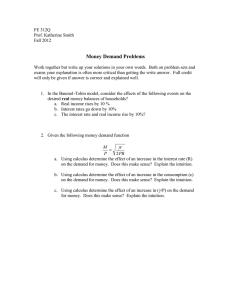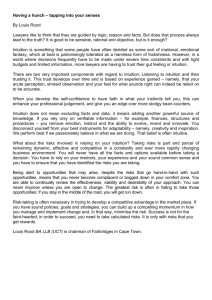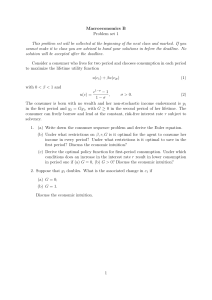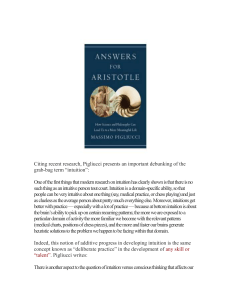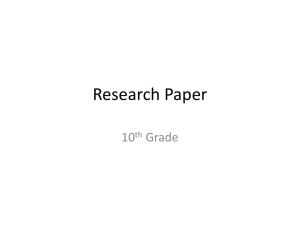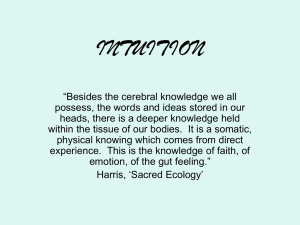Intuition in the spiritual domain As mentioned earlier, intuition may
advertisement
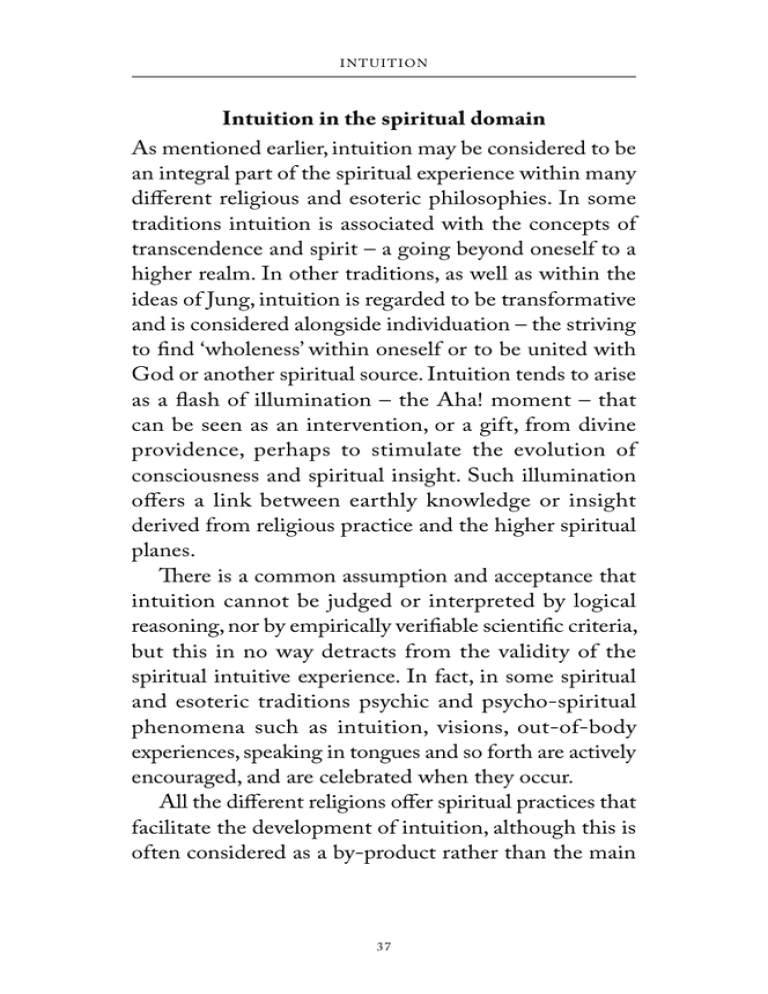
I nt ui t ion Intuition in the spiritual domain As mentioned earlier, intuition may be considered to be an integral part of the spiritual experience within many different religious and esoteric philosophies. In some traditions intuition is associated with the concepts of transcendence and spirit – a going beyond oneself to a higher realm. In other traditions, as well as within the ideas of Jung, intuition is regarded to be transformative and is considered alongside individuation – the striving to find ‘wholeness’ within oneself or to be united with God or another spiritual source. Intuition tends to arise as a flash of illumination – the Aha! moment – that can be seen as an intervention, or a gift, from divine providence, perhaps to stimulate the evolution of consciousness and spiritual insight. Such illumination offers a link between earthly knowledge or insight derived from religious practice and the higher spiritual planes. There is a common assumption and acceptance that intuition cannot be judged or interpreted by logical reasoning, nor by empirically verifiable scientific criteria, but this in no way detracts from the validity of the spiritual intuitive experience. In fact, in some spiritual and esoteric traditions psychic and psycho-spiritual phenomena such as intuition, visions, out-of-body experiences, speaking in tongues and so forth are actively encouraged, and are celebrated when they occur. All the different religions offer spiritual practices that facilitate the development of intuition, although this is often considered as a by-product rather than the main 37 T H E SP I RI T I N AROMAT H ERAP Y aim of religious practice. Nonetheless, it is from the spiritual practices of prayer, contemplation, devotional acts, ritual and meditation that we as aromatherapists can learn to enrich and extend our innate intuitive abilities. You do not have to become ‘religious’ or adopt all the tenets of a particular religion (unless you want to) to benefit from prayer, meditation, etc., although it is helpful to appreciate the values that underpin the religion. These values have a particular and individual expression in each religion, but are essentially universal; love, compassion, humility and the desire to be of benefit to and serve others are values everyone can espouse without necessarily having ‘belief ’ in God or another divine being. Developing intuition Most aromatherapists will already have cultivated and developed their innate intuitive abilities to a greater or lesser extent, as the intimate nature of aromatherapy massage lends itself to such an approach. For many of us intuition is part and parcel of how we work; it is not something we need to think about consciously, nor strive for. We simply intuit information about our clients, their needs and desires and the essential oil blends with which to treat them, as well as massaging intuitively according to what we ‘feel’ and ‘read’ from the client. However, as someone who meditates daily, and has done for many years, I suggest the regular practice of meditation can help strengthen intuition and reinforce ‘being present’ with the client. For the experienced 38 I nt ui t ion aromatherapist it can be easy to slip off into reverie and extraneous thoughts while working with a client, as I know only too well myself. But by not being fully present with the client for the duration of their treatment, we may miss the subtle cues and signs the person unconsciously manifests that we may otherwise intuit information from and then act upon. Unless I can be fully present with the person I am working with for the duration of their session, then I feel I am short-changing them in some way, even if the aromatherapy treatment is deemed successful and the client is happy with the outcome. Significantly, I have found meditation to be a wonderful and effective practice to help me remain fully present in each and every moment – and thus to be able to use my intuition to the fullest advantage. In the next chapter we will explore meditation and techniques that can benefit the aromatherapist, not only to help stay fully present with the client as much as possible, but also to use meditation to stimulate and develop our innate intuition. And having full recourse to our intuition, alongside our theoretical knowledge and understanding, and experience, helps us to be truly holistic aromatherapists. 39

